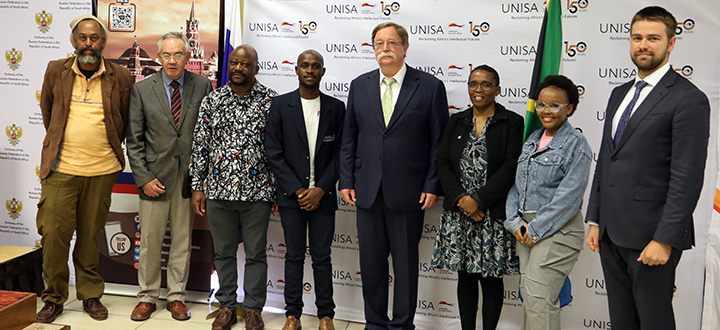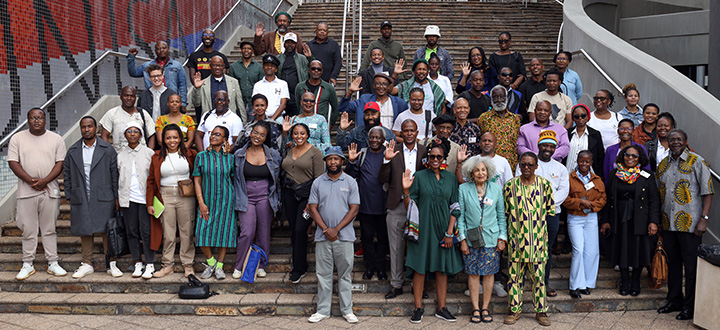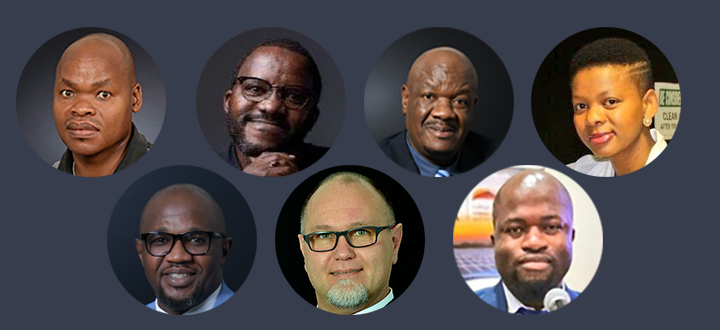College of Human Sciences
Unisa hosts 6th Decoloniality Summer School
The Unisa College of Human Sciences has since 2014 annually hosted the Decoloniality Summer School with a focus on power, knowledge and identity. Welcoming participants to the 2019 Summer School, Professor Mary Moleki, Director for the School of Social Sciences in the College, highlighted the tremendous progress that the College has made through the journey of undertaking the decoloniality project in making sure that authentic African knowledge is known and has the necessary impact worldwide. She said that the attitude of the Summer School is one that seeks to instill a decolonised consciousness, one that will be expressed in our teaching and learning, our relationships and our everyday lived experiences.
This Summer School takes place at a crucial time in the country history. All the issues that have surfaced in the country in the past few years have pointed to the need for engagement, confrontation, cost accounting, and responsibility taking. To this end, the Unisa decoloniality project aims at allowing an opportunity for the interrogation of what it means to be human from the subject that speaks, and engaging in uncomfortable conversations about what it would mean if we were to see each other as human and not falling into different categories of humanity.
This year the lectures and discussions were delivered and facilitated by leading decolonial thinkers and theorists, Professor Sabelo Ndlovu-Gatsheni (Unisa), Professor Mogobe Ramose (Unisa), Professor Rozena Maart (UKZN), Professor Lewis Gordon (University of Connecticut), and Dr Nthabiseng Motsemme (National Institute for the Humanities and Social Sciences).
Professor Gatsheni-Ndlovu addressed a number of topics, including the Entrapment of Africa in Global Coloniality. He introduced concepts that would offer the audience a better understanding of the positionality of Africa in global politics by reflecting on systematic concepts like a modern world system, global coloniality, modern world capitalist economy, world order, empire and colonialism.
On the African decolonial feminist approach, Dr Motsemme contributed with papers focusing on African women’s memories of violence and towards social healing and African women’s ways of knowing, looking at Death and Spirituality.
Professor Gordon in his presentation on theory as critical, decolonial and otherwise provoked the audience with insights on the critique of decolonial theory. According to Professor Gordon, the moment when decoloniality becomes an objective, and not a part of a lager story, it collapses into a religion. He believes that when we decolonise, for example the call to decolonisation the university, we will have to build a new kind of society, in which a different kind of relationship to the production of knowledge occurs. This requires having new kinds of political relationship and infrastructures for the production of knowledge, he said.
Professor Maart discussed through her presentations the idea of decolonial education, what it is, why we decolonise and looking at how the study of black consciousness, psychoanalysis and Derridean deconstruction can help to interrogate these notions.
In his presentations, Professor Ramose discussed the analysis of a philosophical investigation into the conceptualisation history of decolonisation in Africa and the philosophy of research. He spoke on a question of ethics, and a critique of the epistemic decolonial. He is of the view that debates, as normal scientific processes, about the undertaking of the decolonial project should be embraced.
*By Katlego Pilane
Publish date: 2019-01-30 00:00:00.0

 Unisa's student leadership engage with Russian ambassador
Unisa's student leadership engage with Russian ambassador
 Re-igniting and re-imagining Pan Africanism, Afrocentricity and Afrofuturism in the 21st century
Re-igniting and re-imagining Pan Africanism, Afrocentricity and Afrofuturism in the 21st century
 Young Unisa science stars join elite Lindau Nobel Laureate group
Young Unisa science stars join elite Lindau Nobel Laureate group
 Education MEC addresses Unisa autism seminar
Education MEC addresses Unisa autism seminar
 Seven Unisans nominated for the NSTF-South32 Awards 2023/2024
Seven Unisans nominated for the NSTF-South32 Awards 2023/2024